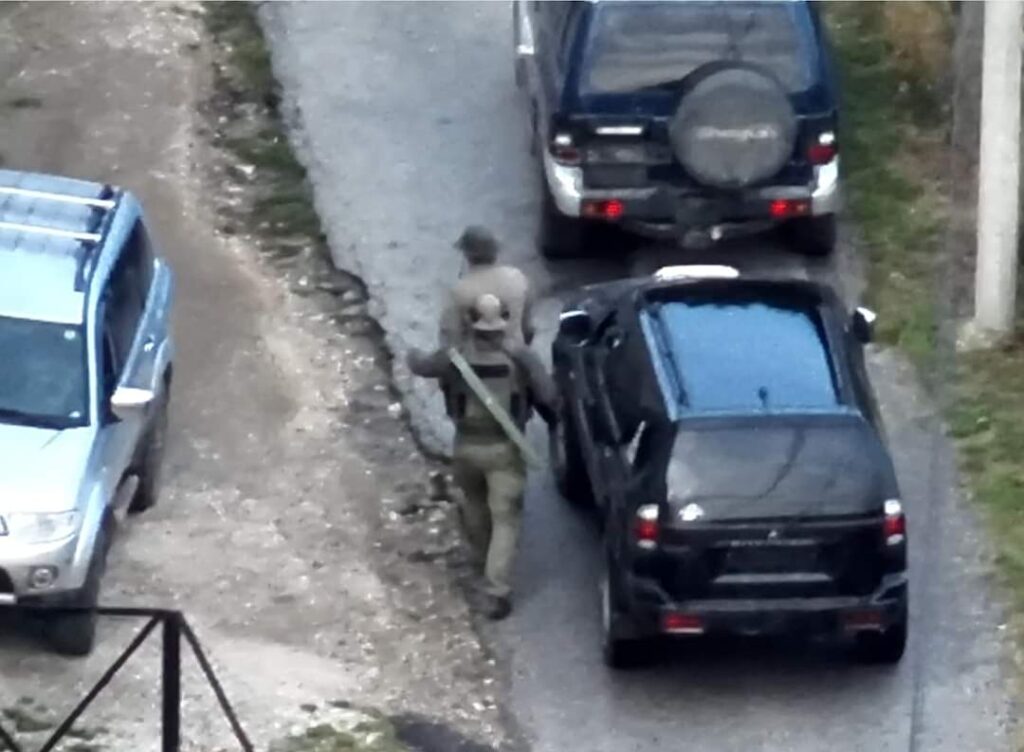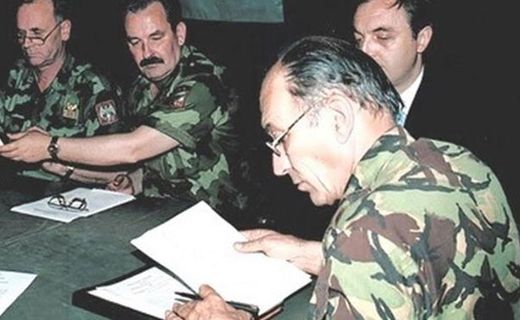Serbian State Terrorism in Kosovo, Europe’s Silence and the Consequences for Regional Security
In the autumn of 2025, a rare but revealing event reignited debate about Serbia’s covert interventions and the persistence of armed violence tied to pro-Belgrade elements operating inside Kosovo. The kidnapping and severe wounding of Milan Vukašinović, a Kosovo citizen of Serbian ethnicity, on November 1, 2025, underscores the ongoing struggle between Kosovo’s institutions and the shadow networks of paramilitary groups reportedly supported by Belgrade.
According to media reports and official testimony, Vukašinović was ambushed near Leposaviq, close to the border with Serbia, by masked men in black and green uniforms-believed to be members of the Serbian Gendarmerie. Former Deputy Minister Radoica Radomirović claimed that the assault was carried out by Milan Radoičić’s group, the same network implicated in earlier attacks against Kosovo Police.
Vukašinović, employed by the Kosovo Insurance Bureau at the Jarinje border crossing, had previously been targeted-his car rigged with explosives and his name circulated as an alleged “spy” for Pristina. After his abduction, he was taken to hospitals in Prokuplje and Niš, Serbia, with life-threatening injuries including the loss of a kidney and spinal trauma. The Kosovo Police later confirmed that the attack occurred inside Kosovo’s territory and reported the incident to KFOR for verification.
If verified, this case represents far more than a criminal act: it is a breach of sovereignty, an instance of armed intervention with state-linked elements, and a continuation of Serbia’s policy of strategic intimidation in northern Kosovo. Yet opaque investigations, non-cooperation from Belgrade, and Europe’s reluctance to pressure Serbia have allowed the case to fade into the diplomatic background.
From Banjska to Leposaviq- Impunity consequences
The Vukašinović case cannot be understood in isolation. It follows a long trajectory of state-tolerated violence, most visibly demonstrated in the Banjska terrorist attack of September 24, 2023, when an armed Serbian group ambushed Kosovo Police officers in northern Kosovo, killing sergeant Afrim Bunjaku. The attackers then seized the local monastery, marking one of the most severe assaults on Kosovo’s sovereignty since the war.
While Kosovo classified the attack as terrorism, Belgrade denied official involvement. Yet the Kosovo prosecution indicted 45 individuals, among them Milan Radoičić, who later publicly admitted his role as organizer and direct participant in the assault. “I personally participated and organized the event in Banjska. I did not inform anyone from the state authorities of Serbia,” he stated a declaration that convinced no one but his collaborators.
Despite overwhelming evidence, including the use of military grade weapons and logistics, no Serbian authority has pursued prosecution. Radoičić remains free, illustrating Serbia’s refusal to hold accountable those who act in its name. The continuity between Banjska and Leposaviq reveals how impunity functions as policy and each unpunished act encourages the next.
The Vucic-Radojčić Nexus
The relationship between Milan Radoičić and President Aleksandar Vučić is emblematic of the fusion between politics, crime, and nationalism in contemporary Serbia. As a former deputy leader of the Serbian List, Radoičić was Belgrade’s enforcer in northern Kosovo-controlling smuggling routes, financing parallel structures, and ensuring local Serb politicians adhered strictly to Vučić’s line.
Vučić himself repeatedly praised Radoičić as a “patriot” and a “brave man,” signaling not distance but endorsement. This was not mere political rhetoric, it legitimized Radoičić’s role as a shadow agent of Serbian policy, one whose criminal networks served as tools of statecraft. Through him, Belgrade maintained a proxy presence in Kosovo, using intimidation and economic control to obstruct institutional integration and manipulate the political agenda.
After Banjska, Radoičić’s connections to Serbia’s security apparatus became undeniable. Nevertheless, the Belgrade War Crimes Prosecutor’s Office questioned and released him within hours, imposing no measures. The message was unmistakable: Radoičić was not a rogue operative but an integral part of Vučić’s hybrid governance model, where criminal structures advance state interests while providing the president with deniability. In this system, destabilization is not a byproduct, it is the method. Organized crime becomes an arm of foreign policy; violence and fear become instruments of negotiation.
Europe’s Diplomacy of Declarations
The European Union’s reaction to such incidents reflects a broader crisis of credibility. Following Banjska, High Representative Josep Borrell and the European Parliament issued statements condemning the attack and calling for accountability. Yet beyond rhetoric, no sanctions, no investigative missions, and no restrictions on Serbia’s dialogue privileges followed. By continuing to treat Vučić as a “stabilizing partner,” Brussels has effectively rewarded destabilization.
The EU’s preference for “dialogue and de-escalation” over enforcement has entrenched a culture of European passivity, where declarations replace deterrence. This failure has consequences. Each time Belgrade avoids repercussions, the message to regional actors is clear: hybrid aggression pays. In northern Kosovo, that message translates into a cycle of recurring crises-cross-border kidnappings, infrastructure sabotage, and sporadic attacks that keep the region on a perpetual edge. Notably, incidents such as the 2024 explosion targeting water infrastructure in northern Kosovo highlight that these acts are not spontaneous-they form part of a sustained strategy of controlled instability designed to preserve Belgrade’s leverage over Pristina and maintain its grip on the Serb minority.
The architecture of “Serbian State Terrorism”
The term “Serbian state terrorism” is not a rhetorical exaggeration but a description of a structural phenomenon. It denotes a system in which paramilitary, political, and economic networks operate under state tolerance or indirect sponsorship. This architecture functions through several mechanisms:
Parallel control: Local paramilitary groups and political elites in northern Kosovo sustain a “not fully sovereign” space, directly coordinated with Belgrade.
– Proxy enforcement: Figures like Radoičić serve as intermediaries between state agencies and organized crime, managing coercion, intimidation, and economic flows.
– Institutional sabotage: Persistent violence and fear weaken Kosovo’s authority, preventing institutional consolidation in Serb-majority areas.
– Legal obstruction: Serbia’s refusal to extradite suspects or engage in joint investigations creates a juridical void, allowing impunity to thrive.
“State terrorism,” in this sense, does not imply that Belgrade formally orders every act of violence. Rather, it sustains an ecosystem of permissiveness in which militant networks act as informal arms of foreign policy-advancing state objectives while preserving plausible deniability.
The price of European hesitation
The paralysis of European and international mechanisms has allowed this model to persist. Investigations into the Banjska attack, the Vukašinović kidnapping, and similar cases remain fragmented and slow, obstructed by Serbia’s refusal to cooperate. Western policymakers, fearful of destabilizing the Belgrade-Pristina dialogue, have largely avoided imposing punitive measures. This strategic restraint has produced an opposite effect: rather than stability, it fosters chronic insecurity. Each unpunished violation emboldens the next, while Kosovo’s sovereignty and citizens’ safety erode. The result is an equilibrium of fear, where Europe maintains “dialogue,” Serbia maintains pressure, and northern Kosovo remains trapped in permanent limbo.
The kidnapping of a Kosovar citizen of Serbian nationality within the territory of Kosovo and the Banjska terrorist attack together expose a consistent pattern: state-linked violence, sustained by Belgrade’s impunity and Europe’s silence. Serbia’s hybrid strategy using criminal proxies and paramilitary networks to project influence-has redefined the boundaries of aggression in the Balkans. By refusing to hold Serbia accountable, the European Union risks legitimizing a new regional norm: that sovereignty can be violated so long as the violator speaks the language of “dialogue.” Until the EU and its partners impose real consequences-through targeted sanctions, international investigations, or security guarantees for Kosovo, the cycle of intimidation will continue.
Europe’s silence has ceased to be diplomacy; it has become complicity. Only by confronting the reality of Serbian state terrorism can the West prevent northern Kosovo from remaining a permanent fault line of insecurity in the Western Balkans.


More on this story: Serbia’s war against Kosovo is asymmetric




